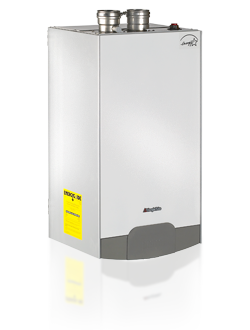Gas Boilers for Radiant Heat: Discussing Radiant Heating Solutions

Looking for a convenient, high efficient and cost-effective method of heating your home? Need a perfect solution of keeping your home at a comfortable temperature level even in cold months? Don’t know what home heating system to give preference to? Don’t bother yourself anymore. Try gas boilers for radiant heat.
Contents
Radiant (Infrared) Heating System: What Is It & How Does It Work?
Radiant or hydronic (hot water baseboard) heating system is an innovative indoors and outdoors heating technology, which stands as a great replacement for the conventional convection heating. It’s ideal for single and multi-zone applications in homes, garages, warehouses, greenhouses, barns, and other buildings. There is no too large or too small building for using it. The system implies the radiant energy heating principle that can simply be observed everyday, sun warming the Earth being the most commonly observed example.
This domestic heating method intentionally uses the radiant heat principles in order to transfer radiant energy from a high-temperature object (heat emitting source) to a low-temperature object. The air in between the source object and the object-to-heat is not heated, unlike the objects it comes in contact with. It means that, when used as a radiant floor system, radiant energy heats the entire room from the floor up, thus saving both energy and money. Typically, it is called radiant in-floor heating.
Radiant In-Floor Heating Advantages
Radiant in-floor heating, or hydronic heating, is a great method of heating your home, greenhouse or any other building with the heat flowing through the embedded (in concrete foundation or under tile or wood floors) tubing, thus warming the flooring thermal mass. This method is very advantageous as it gently warms the entire building or room keeping it at comfortable temperature level. Other advantages include the following:
- more energy-efficient than forced-air or baseboard system (there is no energy lost);
- uses little electricity (saves your electric bill);
- delivers consistent warmth (produces no draft or noise);
- can be used with a variety of heat sources (oil- and gas-fired boilers, wood- and propane-fired boilers, electric modulating boilers, solar heaters, etc.)
Gas Boilers for Radiant Heat as a Perfect Heat Source for Your Home
Gas-fired boilers are considered the best radiant heating solution for your home, though you can choose among other possible variants, like oil-fired boilers, propane-fired boilers, electric models etc. But if you’re looking for gas boiler for radiant heat, you may choose one among the following companies:
- Performance 80/84/86/90/96 Boilers (gas-fired boilers that provide highly efficient radiant performance one can trust);
- Quietside Natural Gas Condensing Boilers (environmentally friendly & energy efficient boilers that provide closed-loop heating water for radiant, fan coil, and other hydronic applications);
- Takagi Tankless Boilers (produce radiant under-floor heating or endless hot water for both commercial and residential buildings);
- Hydrosmart Compact Boilers HS 115 Series (powerful & versatile boilers for efficient radiant heating).
In the end, remember that planning your radiant system also means considering certain factors, like heat source choice, heat load circulation, number of zones or subzones to be heated, and primary/secondary plumbing.
- popular
- new






